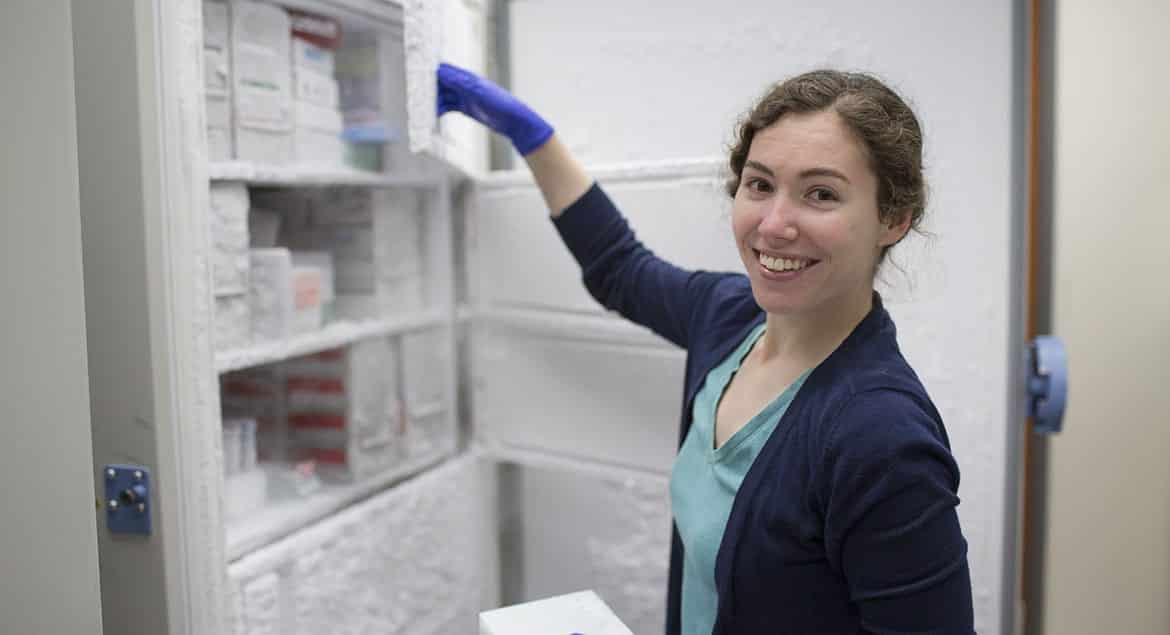“I really enjoy talking about the science. And I get to do that a lot.”
That’s what Katherine Overmyer says about her new role as the Associate Director of the Laboratory for Biomolecular Mass Spectrometry (LBMS) at the University of Wisconsin–Madison. Her position is supported by the Morgridge Institute for Research through an investment to catalyze metabolism research across campus.
Overmyer joined the team after a Morgridge Postdoctoral Fellowship with the Coon Research Group exploring metabolism, often called the “chemistry of life.”
Metabolism provides the fuel for cellular activities and is an essential function for all living systems. Metabolic disruption is linked to many human diseases, including rare metabolic disorders and those like diabetes, Alzheimer’s and Tay Sachs.
It was Overmyer’s family history of diabetes, which affects more than 100 million Americans according to the Centers for Disease Control (CDC), that first ignited her interest in metabolism, specifically in metabolomics—the study of the thousands of molecules working in a biological system.
“All of health is metabolism. It is what makes the world work,” Overmyer says. “And we challenge it all of the time.”
“All of health is metabolism. It is what makes the world work.”
Katherine Overmyer
Consider that our bodies go through periods where we eat—or don’t eat. We diet or change our nutrition. We choose to run, or perhaps we sprint. Our genes play a role in our health, says Overmyer, but the rapid, small molecule changes at the center of metabolism are another side of the story.
“There’s a lot of metabolic signaling,” she says. “Metabolism is the heart of a lot of things. And if we can understand it better, we can solve a lot of problems.”
Through a major dollar investment, the Laboratory for Biological Mass Spectrometry (LBMS) serves as a hub to facilitate metabolism research at UW–Madison and is a focus area for the Morgridge Institute. Paired with scientists and computational resources, the lab is helping more than 100 collaborators across campus identify and quantify metabolites, says Josh Coon, the Thomas and Margaret Pyle Chair at the Morgridge Institute and a professor of biomolecular chemistry and chemistry.
“Mass spectrometers are complicated, expensive, and notoriously difficult,” says Coon. But, he adds, the technology is critical for researchers who need data to illuminate the molecular atlas of a system, a key first step in understanding disease.
The LBMS not only generates data but helps researchers understand how to use massive amounts of data, he says. And that’s where Overmyer comes in, supporting at least a half dozen new campus collaborators each month.
“She’s very, very good at helping our collaborators,” Coon says, noting Overmyer’s ability to create actionable data. “Katie is taking something that we got started and taking it to a new level. She’s a great fit.”
Day-to-day she troubleshoots research and instrumentation issues, mentors graduate students and meets with collaborators and team members while overseeing up to 50 different projects. Small molecule analysis is an emergent area of study and little is known about how these molecules play and impact biological systems.
“I get to interact with lots of people, and I get to ask them, ‘How can we help you? What are the things that we can do to drive science in the next direction?’” Overmyer says.
She’s also excited to continue a project exploring the causes of osteoarthritis. The disease, which affects 10 percent of the adult population, can have a debilitating effect on patients. Through a partnership at UW–Madison and the Scripps Research Institute, Overmyer is examining the molecules in synovial fluid, the joint fluid that surrounds the inflamed/affected joint. To date, there are no non-imaging biomarkers for diagnosing osteoarthritis or assessing the effectiveness of treatments.
